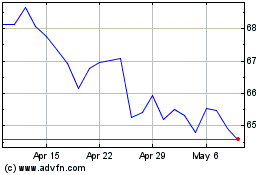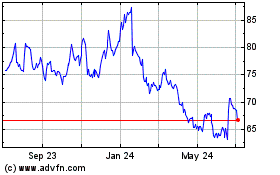Pennsylvania Is Ordered to Provide Hepatitis C Drug to Inmate--Update
January 04 2017 - 3:05PM
Dow Jones News
By Peter Loftus
A federal judge ordered Pennsylvania's corrections department to
provide costly new antiviral drugs to an inmate infected with
hepatitis C, and rebuked the state for restricting inmates' access
to the drugs.
Hepatitis C is an epidemic in prisons, but state corrections
departments have treated relatively few prisoners because the drugs
are expensive, costing about $54,000 to $94,500 per patient.
The new antivirals, sold by Gilead Sciences Inc., AbbVie Inc.
and Merck & Co., began hitting the market in 2013 and have
higher cure rates and less severe side effects than older
treatments. Hepatitis C is transmitted by via infected blood,
including through needle sharing. Chronic infection can cause
serious liver damage if left untreated.
Public and private health insurers also have restricted use of
the drugs -- sparking lawsuits by patients seeking access. In May,
a federal judge ordered Washington state's Medicaid program to pay
for treatments for all infected patients, not just the sickest.
National medical societies say most infected patients should
receive the drugs.
Pennsylvania's Department of Corrections has a policy of
providing the drugs only to inmates with signs of advanced disease
such as cirrhosis, according to court documents.
Mumia Abu-Jamal, a well-known prisoner serving a life sentence
after being convicted of murdering a Philadelphia police officer in
1981, filed a lawsuit against corrections officials last year,
alleging that their failure to treat his hepatitis C violated the
Eighth Amendment's prohibition on cruel and unusual punishments of
prisoners. State prison officials had determined his disease wasn't
severe enough to warrant treatment, according to the lawsuit. Mr.
Abu-Jamal was originally sentenced to death, but a federal court
overturned that sentence after a high-profile appellate campaign
that drew support from capital-punishment opponents, including
celebrities. His murder conviction has been upheld.
The corrections department fought the lawsuit, contending that
its treatment policy was appropriate. In a court document last
year, the state also said giving the drugs to all infected inmates
would cost about $600 million and would squeeze other medical care
and security needs.
U.S. District Judge Robert Mariani in Scranton, Pa., on Tuesday
issued a preliminary injunction ordering the Pennsylvania
corrections department to provide "the most current medications" to
Mr. Abu-Jamal.
The judge wrote Mr. Abu-Jamal "has a serious medical condition.
He will continue to suffer from chronic hepatitis C if he doesn't
receive treatment. His liver will continue to scar and its
functioning will continue to deteriorate." The judge ordered prison
officials to arrange for Mr. Abu-Jamal to see a doctor within two
weeks, and to provide the treatment unless the doctor determines
there are contraindications that would bar treatment.
The ruling applies only to Mr. Abu-Jamal, but the judge also
criticized the corrections department's treatment policy, saying it
has a "fatal flaw" because it imposes an "unreasonable condition"
on eligibility for treatment -- having severe liver scarring or
cirrhosis.
Some other Pennsylvania inmates have filed a separate lawsuit
against the state, seeking treatment for all infected prisoners.
The lawsuit is pending, and similar suits are pending in Minnesota,
Massachusetts and Missouri.
Bret Grote, legal director of the Abolitionist Law Center, who
represents Mr. Abu-Jamal, said the ruling "is an important victory
in the effort to establish a right to the cure for hepatitis
C."
Gabriel Eber, attorney with the American Civil Liberties Union's
prisoner-rights project, said the Pennsylvania ruling is the first
time that a federal court has ordered that the new hepatitis C
medications be administered to a prisoner.
A spokeswoman for the Pennsylvania corrections department said
it is reviewing the ruling.
Write to Peter Loftus at peter.loftus@wsj.com
(END) Dow Jones Newswires
January 04, 2017 14:50 ET (19:50 GMT)
Copyright (c) 2017 Dow Jones & Company, Inc.
Gilead Sciences (NASDAQ:GILD)
Historical Stock Chart
From Mar 2024 to Apr 2024

Gilead Sciences (NASDAQ:GILD)
Historical Stock Chart
From Apr 2023 to Apr 2024
